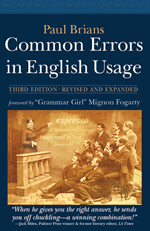There are actually three words here. The simple one is the big growly creature (unless you prefer the Winnie-the-Pooh type). Hardly anyone past the age of ten gets that one wrong. The problem is the other two. Stevedores bear burdens on their backs and mothers bear children. Both mean “carry” (in the case of mothers, the meaning has been extended from carrying the child during pregnancy to actually giving birth).
But strippers bare their bodies—sometimes bare-naked. The confusion between this latter verb and “bear” creates many unintentionally amusing sentences; so if you want to entertain your readers while convincing them that you are a dolt, by all means mix them up. “Bear with me,” the standard expression, is a request for forbearance or patience.
“Bare with me” would be an invitation to undress. “Bare” has an adjectival form: “The pioneers stripped the forest bare.”
Back to list of errors

BUY THE BOOK!
